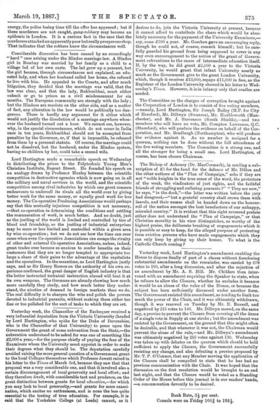Yesterday week, Lord Harlington's amendment enabling the House to dispose
finally of part of a clause without foreclosing substantial amendments on the remainder, was carried by 278 votes to 100, after a long discussion, and after the rejection of an amendment by Mr. A. S. Hill. Mr. Childers then inter- vened with an amendment requiring the Speaker to state, when he refuses to allow the Closure, whether he excludes it because it would be an abuse of the rules of the House, or because the subject has been sufficiently discussed under another form. The Government resisted this amendment, as tending to limit too much the power of the Chair, and it was ultimately withdrawn, though it was renewed on Tuesday by Mr. E. Russell, and negatived by 215 votes to 146. Mr. Dillwyn moved, on the same day, a proviso to prevent the Closure from covering all the items of a single vote in Supply at one stroke ; but the amendment was resisted by the Government, on the ground that this might often be desirable, and that whenever it was not, the Chairman would prevent the abuse of the rule,—and Mr. Dillwyn'a amendment was ultimately negatived by 216 votes against 130. Wednesday was taken up with debates on the quorum which should be held sufficient to apply the Closure, the Government successfully resisting any change, and also defeating a proviso proposed by Mr. T. P. O'Connor, that any Member moving the application of the Closure shall be compelled to state that he has had no previous communication with the Chair. It was hoped that the discussion on the first resolution would be brought to an end last night, and that the Closure would be voted as a Standing Order of the House before this journal is in our readers' hands, —a consummation devoutly to be desired.


































 Previous page
Previous page